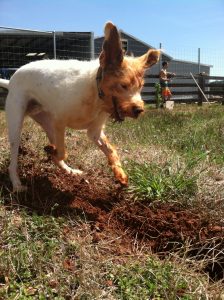02 Apr Animal Companions


Paul A. Goldberg MPH, DC, DACBN, DCBCN
Founder and Consultant to The Goldberg Tener Clinic
Chronic Disease Reversal
Having explored the health destroying effects of loneliness in Part I of this series, we would be negligent if not pointing out that companionship comes in a variety of flavors. Companionship can come from a spouse, relative, child, best friend, parent, sibling or from an animal companion. Each is different but they all have much in common. All play the role of significant others, enabling us to escape the sense of having to face a challenging world alone by providing another spirit for us to interact with.
Our opportunities for friendship are not limited to humans. Pets (or what I prefer to call companion animals) offer affection, unconditional love, fight loneliness and help ease the loss of a loved one.”[1] This is well recognized by those who have animal companions but less recognized by many who could benefit from a furry friend. Animals share much with us and many species can serve as companions. Horses, cats, birds and other species have served admirably in this fashion. The strongest of bonds formed with humans, however, was with canines thousands of years ago. A connection was formed which has continued over the millenniums. The dog has indeed become man’s “best friend.”
The benefits of animal companionship have in recent years been increasingly acknowledged by researchers. The simple act of petting a pooch causes levels of serotonin to rise, thereby helping to fight off depression.
Professor of nursing and veterinary medicine, Rebecca Johnson, of the University of Missouri-Columbia, commented in a news release that “Our preliminary results indicate that the levels of serotonin, a hormone in humans that helps fight depression, rise dramatically after interaction with live animals, specifically dogs. This hormone is critical in the psychological well-being of an individual,”[2] particularly for its benefits in the elderly who as a group can greatly benefit from adopting a pet. A study published in the Journal of Clinical Nursing found that elderly pet owners are significantly healthier as a group as compared to those elderly who did not have pets.[3]
According to Oncologist Dr. Edward T. Creagan[4]:
“Senior citizens who own pets are less likely to be depressed, are better able to tolerate social isolation, and are more active than those who do not own pets. We all need something to live for and something to focus on, besides ourselves. Pets offer us unconditional love, which is of significant benefit to our overall well-being.”
Dogs are extraordinary creatures. They are pack animals and as such have a deep loyalty to those that are part of their family. They have a natural inclination to bond with their owner. With that bonding comes a relationship that exceeds mere friendship. The dog cares about you and your welfare like no one else and senses your emotional state. Your dog will quickly become your guardian, friend, companion and confident. He or she will ask for little other than a bowl of simple food, water and a chance to get some exercise. In return, he or she will do everything he/she can for you up to and including laying their life on the line for you if needed.
 Most dogs are also exceptionally upbeat creatures and pleased by the simplest of things. A pat on the head is appreciated and a walk around the block is enough to send most dogs into ecstasy! When you come home after being gone you will have an unsurpassed welcoming committee. Never again will you feel unappreciated or unloved. You and your dog will form a pack whose bonds are as strong, if not stronger, as those between any two human beings.
Most dogs are also exceptionally upbeat creatures and pleased by the simplest of things. A pat on the head is appreciated and a walk around the block is enough to send most dogs into ecstasy! When you come home after being gone you will have an unsurpassed welcoming committee. Never again will you feel unappreciated or unloved. You and your dog will form a pack whose bonds are as strong, if not stronger, as those between any two human beings.
Your dog will not be judgmental. If you are a bit sloppy, a poor housekeeper, have bad breath, get out of bed a bit crabby at times, don’t have a good income, have health problems, aren’t particularly attractive looking, or are lacking in any other area, your dog will not hold any of that against you. Yes, if we could transplant the dog soul and spirit into an attractive human body of the opposite sex we might all have the perfect friend and mate…as long as we didn’t mind them smelling our rear end periodically!
Your dog can also be an asset in expanding your human relationships. Dogs generally like other people and go out of their way to greet those you come into contact with when you are out on a walk. They can be a great way to break the ice and make new friends. Walking your new canine friend around the neighborhood is a great way to meet new people as well. Friendships and romances have frequently begun with the common bond dog owners have with each other. Go ahead and let your amorous pooch sniff that good looking poodle down the street that belongs to the attractive Paul or Paula and let it be an ice breaker to get to know that person.
Drs. Alan Beck and Aaron Katcher list some of the benefits we can all reap from pets:[5]
- Companionship
- Something to care for
- Pleasurable activity
- Something pleasurable to watch
- A source of constancy
- Security
- Opportunity for play, laughter and comfort.
Pets clearly can help protect us from the devastating damage done by loneliness. Dr. James Lynch says in his book The Language of the Heart[6], “We don’t have pets in our lives to be nice. We have pets because we need them.” Dr. Lynch points out the beneficial effects contact with companion animals produces. Various investigations have concluded that the presence of and contact with a companion animal will lower a person’s blood pressure. Along with that finding other studies indicate that pet ownership can help a person who has had a heart attack to live longer. There is good reason to believe that companion animals help protect the cardiovascular system.
Fundamentally, getting a dog is getting a ready-made friend. There is a commitment in caring for the dog, but its needs are relatively few and the rewards it offers are many. Puppies are particularly cute but you need not limit your choices to a pup. The local animal shelters have a variety of young, adult and mature dogs to choose from each with their own advantages and you will find one that is a match for you, if not on the first visit, shortly thereafter. You may find an adult or elderly dog already housebroken and trained that wants nothing more in the world to go home with you and be your best friend and is likely suffering from the same loneliness that you are. You will find that dogs are extraordinarily capable of expressing gratitude for being brought into your life and allowing them to become part of your family. O.K., you might have to clean up a puddle of pee a couple times during the first week… a very small price to pay for what you will receive in return. Shown below is a brief video containing a compilation of images and video of some of our patients’ companion animals and the joy they bring to their lives.
Problems with loneliness require action. You can’t lie around waiting for someone else to find you and provide you with companionship. If you lack companionship go out and find it. There are multiple ways to do so.
- Get involved in a church or synagogue. Don’t just go to services and leave un-noticed. Get involved with activities at the church with smaller groups of people. It’s your job to be of value so volunteer your services. If you are not happy with one church or synagogue, go visit another one.
- Turn off the T.V., get off the internet and get out. You won’t meet others sitting around watching the boob tube.
- If you are seeking romance go to places where you are likely to find it. Let your friends know you are on the prowl. Go to social events. Yes, I know it takes guts, but whether it looks like it or not the other people there feel awkward and shy just like you do. Join a volunteer group. Don’t worry if you’re not the best looking or smoothest talking man or woman…there are plenty of people out there that have the same imperfections and insecurities. And don’t be overly selective in terms of looks; you’re not likely perfect either! There are personal dating services including those over the internet you can also check out. This can be an effective, non-threatening way of meeting others as long as the service is legitimate, you take reasonable precautions and that you look before you leap.
- Don’t think you are too old to find romance and companionship just because you are in your seventies or eighties. There are many seniors looking for romance who have lots of mileage left on them. And… if you are only in your fifties or sixties…well, heck, you’re just a kid still!
- Quit feeling sorry for yourself. That’s a dead-end street. No matter how lonely you may be there are others out there who are even lonelier. Really. It is not just about you…there are a lot of lonely, frustrated, hurting people out there. Go out and volunteer as a big brother or sister. At a nursing home. At a hospital. For the local humane society. You will find that by helping others you will help solve your own loneliness issues.
- AND back to my original thesis…give serious consideration to getting yourself a companion animal. Take a trip to your local animal shelter (not a pet store). In the pounds and shelters are numerous loving, friendly, lonely dogs (and cats) that want nothing more than to be your best friend. Do yourself a favor and take one (or more) of them home and give them the care and affection they deserve. You will be rewarded many times over in what you receive and likely discover your new best friend has four legs! Shown below are pictures of our companion animals which have brought significant joy to our lives.





Points to Ponder regarding loneliness and finding solutions from this two part series:
- Don’t fool yourself into thinking that you don’t need anyone else. Our biology as human beings requires companionship for good health.
- Companionship can come from a variety of sources including spouses, friends, family and other animals.
- Be realistic in your expectations of marriage. It takes a lot of work and big ups and downs are part of the package.
- Everything in balance. Just as it is important to be with others, being alone some of the time can be important also, allowing us to reflect and regain our composure.
- You may be lonely but you are not alone in feeling it. It comes to all of us sporadically throughout our lives. There are millions of other lonely people out there at any point in time. It is important not to wait for them to reach out to us, but to reach out to them. If you don’t think you need anyone else, remember that other people (and animals) need you.
- Don’t sit around and be lonely waiting for Prince or Princess Charming to come your way on their own…fat chance! Get up, get going and make it happen!
More Articles from The Goldberg Tener Clinic
1) Reversing Autoimmune Disorders
2) Reversing Chronic Skin Conditions
3) An Effective, Causal Based Approach to Digestive Problems
4) Reversing Rheumatoid Arthritis and other Rheumatoid Conditions
5) Reversing Thyroid Conditions
6) Small Intestinal Bacterial Overgrowth (SIBO): A Symptom of Impaired Health
7) Irritable Bowel Syndrome: A Meaningless Diagnosis
8) The Facade of Functional and Alternative Medicine
9) An Effective, Comprehensive Approach to Reversing Allergies
10) You have been misled… the way to lose weight is NOT trying to lose weight.
11) Click here to see our full library of articles.
References
[1] Pets For The Elderly Foundation: http://www.petsfortheelderly.org/index.htm
[2] Johnson, Rebecca; University of Missouri-Columbia news release, Companion Animals: Fountains of Health of Health Conference April 2004
[3] Brodie SJ, Biley FC. “An Exploration of the Potential Benefits of Pet Facilitated Therapy”. J Clin Nurs.1999 Jul;8 (4): 329-37
[4] Creagan E. “Pets And Your Health”. Mayo Clinic Health Oasis Newsletter. July 20, 2000
[5] Beck, A., Katcher, A., Between Pets and People-The Importance of Animal Companionship, (NY, Putnam, 1983) (Available from Dogwise).
[6] Lynch, James J., The Language of the Heart (NY, Basic Books, Inc., 1985). Chapter 6.
[7] For Additional References on the benefits of pets see:
- Stallones, Lorann, “Companion Animals and Health of the Elderly,” People, Animals, Environment. Fall (1990). pp. 18-19.
- Siegel, Judith M., “Stressful Life Events and Use of Physician Services Among the Elderly: The Moderating Role of Pet Ownership,” Journal of Personality and Social Psychology. Vol. 58, No. 6 (1990), pp. 1081-1086. (59K, RTF)
- Rosenkoetter, Marlene M., “Health Promotion: the Influence of Pets on Life Patterns in the Home,” Holistic Nursing Practice 5:2 (1991). pp. 42-51.
- Raveis, Victoria H., Mesagno, Frances, Karus, D., Gorey, “Pet Ownership as a Protective Factor Supporting the Emotional Well-Being of Cancer Patients and Their Family Members”, research paper (Memorial Sloan-Kettering Cancer Center Department of Social Work Research Unit, NY, 1993). (74K, RTF)
- Poresky, R.H., “The Young Children’s Empathy Measure: Reliability, Validity and Effects of Companion Animal Bonding,” Psychological Reports, June 66(3 Pt. 1) (1990), pp. 931 -936.
- Gammonley, J., Yates, J. “Pet Projects: Animal Assisted Therapy in Nursing Homes,” Journal of Gerontological Nursing. January 17 (1) (1991), pp.12-15.
- Kidd, A.H., Kidd, KM., “Benefits and Liabilities of Pets for the Homeless,” Psychological Reports June 74(3 pt. 1) (1994) pp. 715-722.
- Waltner-Toews, David, Ellis, Andres, Good for Your Animals, Good for You (Ontario Veterinary College, University of Guelph, 1994) Distributed by Delta Society.
- Lander, S.M., Reid, J., “Hospital Dogs Raise Spirits, Not Infection Rates,” Hospital Infection Control December 19(12) (1992) pp.162-164.










No Comments